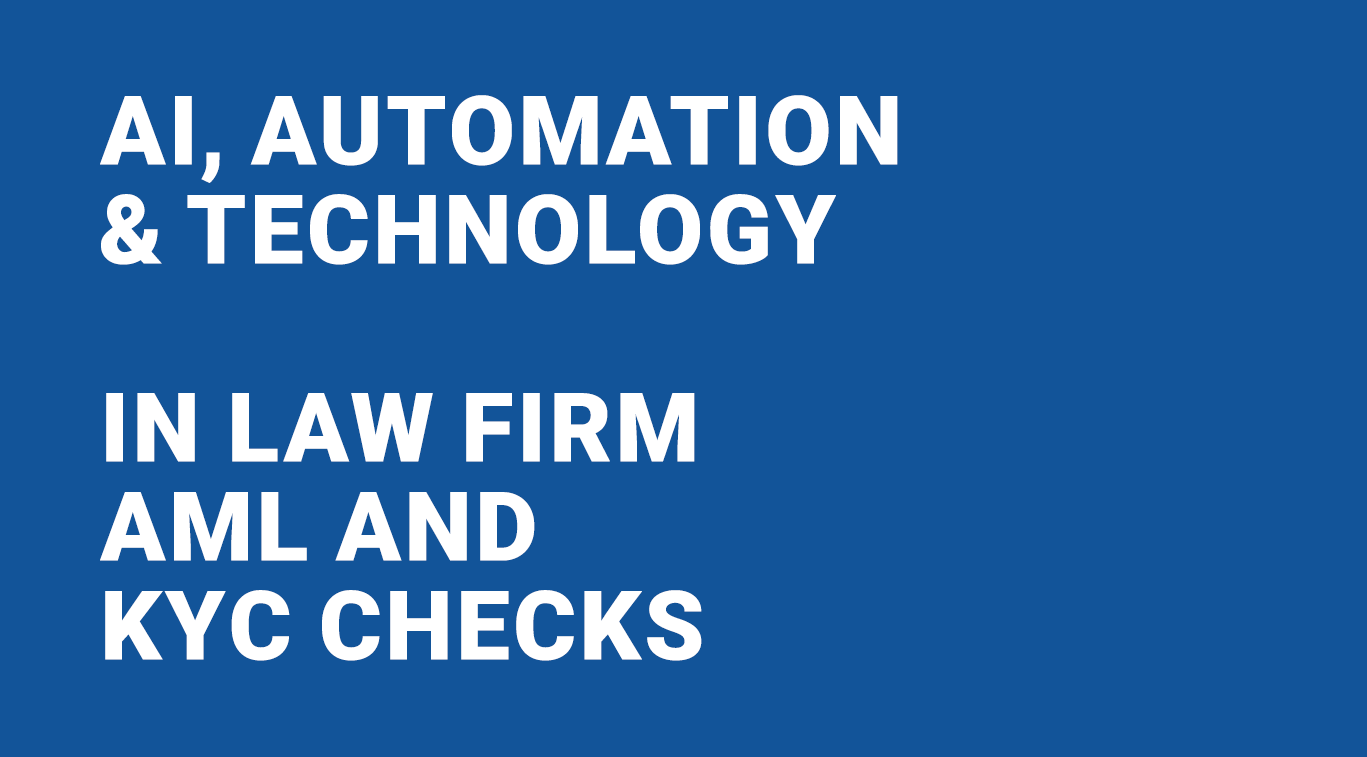AI, Automation & Technology in Law Firm AML & KYC Checks

Written by Maryam Khan
Blogger

Legal technology solutions are rapidly modernising and remodelling the legal sector. Artificial intelligence, machine learning, and automation, in particular, have been the core drivers of this modernization. This article discusses the impact of such technologies on a law firm’s Anti-Money Laundering (AML) and Know Your Customer (KYC) practices and how law firms can further benefit from integrating these functions into their business processes.
The use of artificial Intelligence in the legal sector has significantly facilitated the process of conducting KYC checks and meeting AML regulations. Artificial intelligence backed legal software such as practice management systems, document management software, client relationship management software and case management software monitor all law firm activity and raise alerts for any suspicious activity or unusual transactions being processed on behalf of a client. Additionally, artificial intelligence enabled surveillance aids in countering risks and fraud when taking on a new client or partnering with a new organisation [1].
Integrating technology in KYC and AML Practices
Know Your Customer (KYC) Checks
KYC checks refer to the process of verifying and identifying a clients identity as part of the onboarding process before providing them any legal services or advice. [2]. Just like all other businesses, law firms are in need of adopting technology-based KYC checks that are automated and can be completed in a shorter amount of time. Artificial intelligence in the legal sector has mainly influenced KYC checks by assisting companies in electronic identity checks, suspicious activity and risk monitoring and conducting due diligence.
Identity verification is one of the most important aspects of the legal profession when onboarding clients. Verification and confirmation of an individual or organisation’s identity, registration number and financial position is required prior to taking on a client. As per a case study by Thomson Reuters it takes about 26 days for a client to be onboarded, and during this time period, the client is contacted by banks for retrieving relevant information [3]. This is a relatively long process, hence there are greater chances for human errors if done manually.
Law firms are now making use of legal workflow automation, and digitising this process by the incorporation of artificial Intelligence and machine Learning in their operations. Law firms are now using AI-backed KYC checks to verify their clients and understand their financial history within a matter of a few minutes. AI has transformed KYC checks by using automation and artificial intelligence to keep in line with new compliance and regulatory changes [4].
Anti-Money Laundering (AML) Practices
Artificial intelligence backed software help detect money laundering using built in specialised algorithms. In essence, these algorithms process and analyse large amounts of data and raise an alert if anything unusual is discovered such as unexpected transactions. Algorithms can pre-fill reports with essential data and standardise language and terminology, saving lawyers time when dealing with potentially suspicious activities.
The incorporation of artificial intelligence and machine learning has proven to be useful in complying with AML regulations. Biometric metrics, such as face ID recognition, are now widely used across the legal industry and may also be considered as proven technology that assists AML obligations, particularly in remote situations [5]. Therefore, by making use of such technology-backed functions, law firms are saving time, working more efficiently and providing an overall greater client experience. and enhancing the customer experience they deliver. According to a Legal Futures article, law firms have implemented such legal technology software within their conveyancing functions to verify client identity and significantly streamline their identification process which is convenient for both the firm and their clients [6].
How are law firms benefiting from this?
The use of automation and artificial intelligence in the legal profession, particularly within AML and KYC practices have benefited law firms in a number of ways. Most importantly, they offer law firm’s greater compliance and security, increase their efficiency and protect their reputation.
Increased Efficiency
Artificial intelligence helps in eliminating all the tedious and repetitive manual tasks through automation [7]. The automation of tasks such as drafting board minutes, document organisation and filing has significantly reduced the risk of human error as there is little to no human involvement in these processes. This also helps law firms reduce their costs as they will no longer have to hire legal assistants or paralegals to take on administrative tasks involved in AML reporting or KYC checks. Law firms can allocate the time saved through automation to more complicated tasks that require a lawyers skills and expertise.
Greater Compliance & Security
Using technology in AML & KYC checks ensures law firms are compliant in their processes, saving them from Solicitors Regulation Authority investigations and heavy fines for breaching AML laws. This is an extremely important point, as there have been cases in the past where leading UK law firms have been heavily fined for failing to stay compliant and correctly follow AML rules and regulations [8].
Reputation Management
Lastly, law firms do not want to be associated with clients or organisations that have are involved in criminal activity or have a history of fraud, tax evasion or any other form of financial misconduct. This can be completely avoided by having a thorough AML and KYC process in place that flags suspicious activity or any criminal history before a potential client or partner organisation is onboarded. This allows law firms to run proper background checks and conduct proper due diligence before any business relationship commences.
The Importance of AML & KYC Checks in Law Firms
It is a general misconception that AML issues are mainly focused on by financial institutions. However, law firms and in-house legal departments need to prioritise complying with AML regulations because they are equally at risk. Criminals usually target law firms because lawyers are required to complete certain transactions which could potentially aid money laundering or terrorism funding if due diligence and KYC checks are not thoroughly carried out [9] This places the responsibility on law firms who may inadvertently facilitate money. laundering [10]. Therefore, lawyers have an elevated ethical and legal obligation to look out for and not facilitate financial crime as more intricate methods to launder money are developed [11].
Final Thoughts
Artificial intelligence and machine learning are still evolving. Despite the ambiguities surrounding its use and results, the growing complexity of money laundering has made AI and machine learning a necessity for law firms. As the legal sector further modernises, the growth in the adoption of artificial intelligence and the wider use of technology in the legal sector for AML practices and other means of compliance will become a norm.
References:
[2] ‘Know Your Customer in Banking’ Thales Group at https://www.thalesgroup.com/en/markets/digital-identity-and-security/banking-payment/issuance/id-verification/know-your-customer
[3] ‘Anti-Money-Laundering (AML) & Countering, Financing of Terrorism (CFT) Risk, Management in Emerging Market Banks’ IFC (2019) at https://www.ifc.org/wps/wcm/connect/e7e10e94-3cd8-4f4c-b6f8-1e14ea9eff80/45464_IFC_AML_Report.pdf?MOD=AJPERES&CVID=mKKNshy
[4] Oliver Smith, ‘How Artificial Intelligence is Revamping AML & KYC?’, Medium (2020) at https://medium.com/shufti-pro/how-artificial-intelligence-is-revamping-kyc-and-aml-f4b1538d5bc0
[5] ‘Legal Sector Affinity Group Anti-Money Laundering Guidance for the Legal Sector’ SRA (2019) at https://www.sra.org.uk/globalassets/documents/solicitors/firm-based-authorisation/lsag-aml-guidance.pdf?version=48f52c
[6] ‘Client Service Improved Through AML Technology’, Legal Futures (2019) at https://www.legalfutures.co.uk/associate-news/client-service-improved-through-aml-technology
[7] Joe McKendrick, ‘Artificial Intelligence Will Replace Tasks, Not Jobs’ Forbes (2019) at https://www.forbes.com/sites/joemckendrick/2018/08/14/artificial-intelligence-will-replace-tasks-not-jobs/?sh=63be9349a7fa
[8] ‘Top UK law firm fined record sum for breaching money-laundering rules’ Guardian (2022) at https://www.theguardian.com/law/2022/jan/06/top-uk-law-firm-fined-record-sum-serious-money-laundering-rule-breaches-mishcon-de-reya
[9] Grant Yuill, ‘Why your Law Firm needs a system to do AML and KYC checks’ Denovobi (2020) at https://www.denovobi.com/articles/why-your-law-firm-needs-a-system-to-do-aml-and-kyc-checks/
[10] Ibid
[11] ‘AML Guide for Law Firms’ Sanctions, (2021) at https://sanctions.io/aml-guide-for-law-firms/








